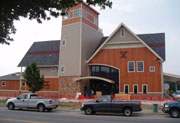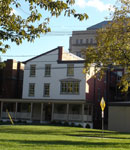 RU Camden Boathouse on Cooper River RU Camden Boathouse on Cooper River
|
Rutgers-Camden
Department of Sociology, Anthropology and Criminal Justice
Fall 2008 Newsletter
|
|
|
Spring 2009 Semester Pre-Registration Begins Nov. 9th
Read this before you register!
Pre-Registration for the Spring 2009 Semester begins on November 9th at 10:00 p.m. for students with 90 credits; pre-registration for everyone else begins the next evening at 10:00 p.m. All students are strongly encouraged to see their departmental advisor in planning their schedule. Here are a few tips to keep in mind:
Focus on getting your required courses out of the way first, remembering that most are not offered every semester. All Criminal Justice and Sociology students should take Methods of Social Research (920:301) as soon as possible; it is a prerequisite for several upper level courses. Failure to take it early along may delay your graduation. For future offerings of this and other required courses, students should consult our future schedule webpage.
Many of your questions about advising may be answered by consulting our department’s Sociology Advising Page and ourCriminal Justice Advising Page.
Major Advising: If you don’t know who your advisor is, check theonline list of advising assignments (excel file). If you don’t find your name there, see department secretary Sherry Pisacano in the departmental office to get one assigned.
Click here for a combined list of Anthropology, Criminal Justice, and Sociology courses for Spring 2009.
Professor Ted Goertzel’s hybrid internet course on Cyberspace and Society has had a good start in the fall and will be repeated in the spring semester. The course meets once a month on Saturday mornings with the rest of the work done online. In the fall, students did web pages and presentations on topics including computer gaming, children’s web sites, virtual worlds, online education, social network sites, privacy and the use of the internet by terrorists. All the reading material is online, and students take weekly quizzes and monthly in-class exams. The class meets in the new computer classroom in the Campus Center and enrollment is limited to 46. Details on this semester’s class are on the course web site at:https://mysite.verizon.net/~tedgoertzel/CybSocSched.html
Beginning Spring 2008, Professor Gail Caputo will be teaching Statistics for Criminal Justice (202:302), a new undergraduate criminal justice elective course. Designed with criminal justice majors in mind, the course covers basic concepts and elementary statistics to help students understand what statistics are all about, analyze and interpret statistical research findings, and prepare students for courses in advanced statistical data analysis. A special focus of this course is on the conceptual logic of statistical procedures. Students interested in attending graduate school in either criminology or sociology are especially encouraged to take this course.
Quick Access to Course Information:
|
Spring 2009 Dept. Courses
|
Two Year Dept Schedule
|
|
| |
|
|
|
|
|

Honor’s Seminar Students and Camden’s MetEast Students Collaborate
This fall, Professor Jane Siegel is giving the Rutgers freshmen in her honors seminar course “Children and Violence” a unique opportunity to work on a collaborative project with students from MetEast High School in Camden. MetEast is not your typical high school. Under the motto, “Educating Camden’s Students One Student at a Time,” MetEast provides a unique curriculum to approximately 120 students. Upon enrollment, students identify their interests and pursue their passions by engaging in rigorous work in the surrounding community. The students meet in small groups and are mentored by an advisor. The curriculum consists of book groups, seminars, and independent work. MetEast’s mission is to give its students a highly personalized learning experience, defined by an individual learning plan, daily advising, internship mentoring, and rigorous academics based on student interests. Most importantly, in a school district with high drop-out rates as compared to other NJ districts, MetEast’s focus remains on the individual student to be prepared to enter and succeed in college.
Once a week for four weeks, MetEast students and their advisor, Mr. Keinan Thompson, have come to Rutgers to get together with Dr. Siegel and her students. Their initial meetings focused on discussions about Fist, Stick, Knife, Gun, a book by Geoffrey Canada that both classes read. In their first meeting, students introduced themselves and talked about their experiences with violence in discussions that highlighted the different kinds of exposure to violence in the backgrounds of the two groups of students. The MetEast students all come from Camden, whereas the majority of Rutgers freshmen come from suburban New Jersey and their experiences reflect the differences in levels of violence in urban and suburban environments. Students’ experiences range from little or no exposure to violence for most of the Rutgers students to frequent exposure for many of the students in Camden – certainly sobering and eye-opening for most students. As one Rutgers student wrote on the Honors College blog: “If first impressions are the most important then these students certainly blew me away, I eagerly await to start working with them as soon as possible and hope that our collaboration will be equally rewarding for us as it for them.”
One goal of this collaboration is to design a survey for children and young adults about their experience with violence. The students will administer the survey to Camden high school students as well as to Rutgers students as a class project. After the surveys are administered, the students will analyze the results and make presentations during the final week of class. This exercise offers students an opportunity to learn the “ins and outs” of survey methods and to further develop their critical thinking skills.
More student reflections on the honors seminar are available at the seminar blog.
|
| |
Students Gain Valuable Research Experience & Publications Department majors have been been mastering research skills and making important contributions by working with faculty members on publications and conference presentations. Recent examples that highlight Profesor Michelle Meloy’s mentoring of students include:
- Eight students were involved in the report that Professor Meloy recently submitted to the Governor’s Advisory Council Against Sexual Violence. Entitled“Sexual Victimization Among Disadvantaged and Vulnerable Populations,” this multidisciplinary literature review covers what is known about the sexual and physical violence endured by vulnerable or understudied populations including rape against physically or cognitively impaired persons, male rape, prison rape, rape of sex workers, gay and lesbian violence, and other topics. Many current and former Rutgers’ students participated in this research: Brittany Bishop, Shareda Coleman, Kristin Curtis, Michael Longo, Beth McConnell, Shannon Paradise, Andrew “Pete” Paolini, and Kristin Tecza.
- Graduate student and research assistant Kristin Curtis recently presented the key findings of the report on sexual victimization among vulnerable populations (noted above) at the council meeting of the Governor’s Advisory Council Against Sexual Violence held at Rutgers-New Brunswick. Several state-level department administrators and elected officials were in attendance to hear her talk.
- In October 2008 Professor Meloy, Susan Miller and graduate student Kristin Curtis published a paper “Making Sense out of Nonsense: The Deconstruction of State-Level Sex Offender Residence Restrictions” in the American Journal of Criminal Justice. The article investigated the geographical distribution and content of state-level proximity restrictions for sex offenders. Several of our undergraduate students (Adam Bermudez, Melinda Cobian, Tammy Jones, Jason Ronka. and Sylvia Wyche) assisted in the nationwide data collection for this project.
- Professor Meloy and Shareda Coleman (Rutgers-Camden Department of Sociology, Anthropology and Criminal Justice 2006 alumni and current Villanova University graduate student) have a forthcoming book chapter “You Can Run But You Cannot Hide: GPS and Community-based Sanctions” in an anthology edited by Richard Wright on sexual violence and sex offenders. This study covered the history and uses of electronic technology within the criminal justice system. Policy makers and practitioners from across the country were interviewed about their state’s use of Global Positioning Monitoring to track offenders living in the community. Rutgers’ students Michael Moncil and Lisa Descano assisted in the data collection and research for this project.
- Brian Tovinsky, CJ major, was selected for a 2008 Dean’s Student Undergraduate Research grant. He worked under the direction of Dr. Meloy and studied the media’s depiction of crime and crime victims.
|
| |
Some Recent Faculty Research Highlights
Page proofing is complete for Professor Drew Humphries’ edited anthology onWomen, Violence, and the Media, to be published by the University Press of New England in early 2009. Prof. Humphries reports: “My next project is an examination of justice concepts in media narratives about crime and violence and I am interested in supervising independent studies for students interested in this media-related research.”
Professor Michelle Meloy recently coauthored, with Ronet Bachman, “The Epidemiology of Violence Against the Elderly: Implications for Primary and Secondary Prevention” in the Journal of Contemporary Criminal Justice. Using homicide data from the Supplementary Homicide Reports and robbery and assault data from the National Crime Victimization Survey, they explore several issues surrounding elderly homicide and nonlethal violence of mature adults.
When a senior Department of Justice employee recently attended a conference presentation by Prof. Jon’a Meyer based on an upcoming publication, he asked many questions and promised to suggest reforms to his supervisors regarding how Native American juveniles are processed in the federal courts. He said he was shocked to hear about the weaknesses in the process and said reforms were in order. It’s not often that a professor’s academic research gets such immediate attention from policymakers! Dr. Meyer’s book chapter, “Ha’á_chíní, haadaah naasdah (‘They’re not going to be young forever’): Juvenile Criminal Justice,” will be published shortly inCriminal Justice in Native America, edited by Marianne October Nielsen and Robert Silverman (University of Arizona Press).
Profs Meloy and Meyer each had invited entries featured in the recently publishedEncyclopedia of Interpersonal Violence, edited by Claire Renzetti and Jeffrey Edleson. Prof Meyer’s entry was on infanticide and Prof. Meloy’s entries were on sex offenders.
Professor Ted Goertzel has joined with Tulio Kahn, research director of the Public Safety Department of the state of São Paulo in Brazil, to study the remarkable drop in homicide in São Paulo. Homicide rates have been cut in half in the years from 2001 to 2007. The decline in the city of São Paulo was especially striking and parallels the similar decline in New York City in the 1990s, a city of about the same size. Goertzel and Kahn conclude that the decline may be attributed to more effective policing methods, including the better enforcement of strict gun control legislation. It demonstrates that effective measures can be taken to reduce lethal crime in a developing country without waiting to solve underlying socioeconomic problems. A preliminary summary of the findings in Brazzil News is available online.
In a recent issue of the journal, Pediatrics, Professor Jane Siegel and a group of researchers in Boston, led by Dr. Deborah Frank, investigate the effect of parental incarceration on at-risk youth. Dr. Frank has been following a group of children since birth. Now in their teens, several children have parents who have been incarcerated for some period of time since the children’s birth. Dr. Siegel became part of the project team because of her expertise about parental incarceration. Analyses of data showed that children whose fathers had been incarcerated reported significantly more depressive symptoms than other children, even after taking into account other factors such as prenatal cocaine or alcohol exposure or school age violence exposure. Teachers also reported that the children of incarcerated fathers engaged in more externalizing behaviors (e.g. aggression and acting out).
Many people are aware of the controversies connected with the rules the World Trade Organization (WTO) sets for trade in goods, but most are unaware that through the General Agreement on Trade in Services (GATS), a broad array of services, from education and water provision to tourism, have also been brought under the auspices of the WTO. Professor Robert Wood’s “Tourism and International Policy: Neoliberalism and Beyond,” which will appear shortly in Sage Publication’s Handbook of Tourism Studies, finds that GATS’ neoliberal premises point to serious problems in developing a sustainable tourism industry, and uses the case of the largely-unregulated cruise ship industry as a cautionary tale in this regard.
|
|

 Prof. Wood accepting dept. award from President McCormick in 2003 Prof. Wood accepting dept. award from President McCormick in 2003
|
Prof. Wood To Retire From Teaching At End of Spring Semester
Professor Robert Wood will be retiring from teaching at the end of the Spring 2009 semester. Before coming to Rutgers in 1981, Professor Wood taught at the University of Massachusetts at Boston. His first full-time teaching was in East Africa, where he taught at Kivukoni College in Dar es Salaam, Tanzania, between his junior and senior years as an undergraduate. Prof. Wood chaired the department for a total of nine years on two different occasions and considers the highpoint of his chairpersonship to have been the receipt, on behalf of the department, of the Rutgers university-wideProgrammatic Excellence Award in Undergraduate Education in 2003.
Professor Wood received his B.A. from Harvard and his Ph.D. from the University of California at Berkeley. His first book, From Marshall Plan to Debt Crisis: Foreign Aid and Development Choices in the World Economy, was published by University of California Press. His second book, coedited with the French anthropologist Michel Picard, Tourism, Ethnicity and the State in Asian and Pacific Societies, was published by University of Hawaii Press. Over the course of his career, he has published over three dozen articles and book chapters on a variety of subjects, particularly on globalization and development.
Professor Wood’s first love has always been teaching, and he has been the recipient of three teaching awards from Rutgers and one from the American Sociological Association. He has been pioneer in the use of instructional technology and has offered numerous workshops at professional conferences and served as an IT consultant for several publishers. Since he has regularly taught three different required courses in the sociology program (Introduction to Sociology, Sociological Theory, and Social Stratification), he has been well known to almost all sociology majors in the department for more than 25 years. In recent years his wife Monika has taught several courses in the department as well. His two sons, Nicholas and Timothy, are both in Ph.D. programs, in history and computer science respectively.
In addition to his teaching and scholarly pursuits, Professsor Wood has always enjoyed nature and the outdoors, including hiking, biking, backpacking, and gardening. He has been an avid traveller, taking year-long trips around the world twice and leading Rutgers study tours to Japan and Southeast Asia, but reports being ready for a settled life in the countryside, probably in Virginia. “I know I will miss my students and colleagues at Rutgers,” he says, “but Monika and I are also excited about beginning a new and different chapter in our lives together.”
Professor Wood will be teaching Introduction to Sociology, Social Stratification, and Globalization and Social Change in the spring semester.
|
 |
Combined BA/MA in criminal justice, the ultimate double count
Under a new Combined BA/MA program at Rutgers-Camden, outstanding juniors may apply to take up to two graduate courses during their final year at Rutgers-Camden (one each semester). Those courses can be used to fulfill BA requirements (e.g., as CJ or free-floater electives) but may also applied toward the ten courses required for the MA in criminal justice if the student pursues graduate study here. Application to this program requires a 3.5 GPA and three letters of recommendation. Students interested in the Combined BA/MA program should contact Dr. Jon’a Meyer, the director of the criminal justice graduate program.
|
|
|
Making Learning Fun (well, sort of…)
Professor Ted Goertzel is using crossword puzzles to spice up exam review. Click on the image to the left to see if you’d be ready for his methods midterm exam! Three crossword puzzes that Professor Meyer has created (using a different software program) may be found at https://sociology.camden.rutgers.edu/theorystf/index.html
Professor Jon’a Meyer has had students and colleagues create limericks that capture the essence of criminological theorists. Enjoy them–and maybe learn some theory–athttps://sociology.camden.rutgers.edu/theorystf/limerick.htm.
Professor Cati Coe helps readers of her Dilemmas of Culture in African Schools book by providing online videos, drawings and other resources from her fieldwork in Ghana. In a similar vein, Professor Robert Wood worked with students James Flatley and Etienne Jackson in 2004-5 to produce a Down Germantown Avenue, a video illustrating the first chapter of Elijah Anderson’s widely-read Code of the Street. The department continues to get a steady stream of requests for the DVD version, which is used in dozens of schools and universities around the country.
To introduce sociology to potentially-interested students, the department maintains aSociological Challenges webpage challenging students to develop their own insights about suicide rates in the U.S., baseball in Japan, and violence in Philadlephia. The goal is to show that grappling with issues in sociology, anthropology and criminal justice can be fun as well as intellectually stimulating.
|
 These books and many others are currently available for free These books and many others are currently available for free
|
Free Books Available in Sociology Lounge!
The books in the bookcases in the student lounge on the second floor of the Sociology building are available free to those who will use them! Most are contributed by faculty members who no longer need them, and there is a an excellent mix of sociology, anthropology and criminal justice texts and monographs. The texts particularly make excellent reference sources for many courses (but be sure to cite them if you use them for your assignments). There are books on a wide variety of specialized topics as well. The selection keeps changing, so it’s a good idea to check it out periodically. The price is just right!
|
 The Department’s Non-Virtual Home The Department’s Non-Virtual Home
|
Our Web-Enhanced Curriculum Offers Online Resources
To Help Students Do Well
If you’re not yet familiar with it, we recommend exploring our website, which provides a broad array of resources to assist you in finding the information you need and in doing well in your courses. As the illustration below shows, the website is divided into two sections, the departmental homepage and the web-enhanced curriculum, each with its own set of resource links. Check it out! There are resources to help you do well in your courses!
For example, ever forget the different cutoffs for measuring the strengths of the correlation coefficients for cross-tabulations and scatterplots respectively? Go the the Table and Graph Format page, highlighted below, and find reminders both about the proper placement of independent and dependent variables and about cutoff points for Cramer’s V and Pearson’s r.
|
Departmental Homepage
Online Syllabi & Course Web sites
Masters Program in Criminal Justice
Faculty Resources
Current Newsletter
Faculty Bios
Major Requirements
Minor Requirements
Course Schedule
Departmental Mailing List
Masterton Award
Sociology Advising Information
CJ Advising Information
|
Web-Enhanced Curriculum HomepageOnline Syllabi & Course Web sites Masters Program in Criminal Justice Current Newsletter Plagiarism Policy and Guidelines Citation Guidelines Table and Graph Format Library Resources Online MicroCase Resources Online Research Tutorials and Videos Virtual Tours Recommended Web sites Writing in the Discipline Student Research Opportunities Streaming Audio and Video Project
|
You can learn more about our web-enhanced curriculum in the online journal, Innovate,which included an article about our department in its first issue by Prof. Wood, entitled“Scaling Up: From Web-Enhanced Courses to a Web-Enhanced Curriculum.“ To access it, you must register for free at the Innovate site (just unclick the box about promotions if you don’t want to receive them). It’s a good way to learn about how the department is using technology to enhance teaching and learning and what its website has to offer you.
Dept. E-Mailings: Periodic department mailings about events and departmental news are sent to all sociology and criminal justice majors. To receive them, be sure that you have declared sociology or cj as your major and be sure that the email address you wish to use is registered at the Rutgers student directory. The list is more fully described at the department’s E-Mailing List web page
|
November 1, 2008 . Contact Robert Wood with comments or questions.
|